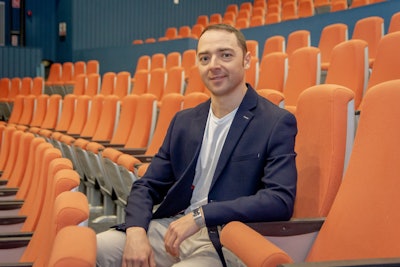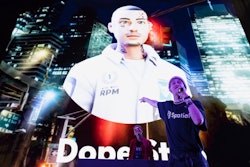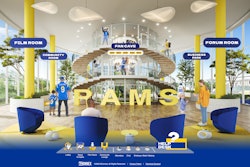
Alex Chernenko can speak six different languages: Ukrainian, Russian, English, Romanian, Turkish, and German (the lattermost he says is fading, but it sounded just fine to our non-native ears). So it's not surprising that he is the CEO and founder of Translit, a remote simultaneous interpreting (RSI) platform that helps event planners add a multilingual component to their events.
Chernenko is also a native of Ukraine, and after war broke out between Ukraine and Russia earlier this year, he has deployed Translit's services to refugees arriving in Ireland, where he and Translit are based. As the company aids them through this difficult time, it's also unveiling a number of updates.
Since Translit launched in January 2021, the company has worked with clients like Mastercard, Guinness, Enterprise Ireland, and Mindvalley on events. New features include the ability to access the platform—which is now available on a white-labeling basis—on any browser, as well as mobile devices, and clients can also now integrate Translit's software into any virtual platform.
BizBash recently sat down with Chernenko to discuss in-depth how Translit is working with Ukrainian refugees in Ireland, his love of languages, and why event planners who add multilingual interpretation to their events could see an increase in engagement and audience growth.
What inspired you to create Translit?
Languages have been a passion since my early days. From about age 10, I started learning a language each year, and from age about 15 or 16 I began my work as a translator and interpreter. But languages were something I never considered a career, so I studied computer engineering and spent about seven years in the IT industry. In late 2009, I realized I’d like to combine my IT skills with my language skills—and that’s how Translit came to be. It’s a fusion of translation services and IT, and that’s where the name came from.
We built our first piece of technology in 2019, which of course was pre-COVID, that would allow anybody to book an interpreter directly without going through an agency. We were on a mission to disrupt the language interpretation industry and said there is an issue with [the cost] of booking interpreters, so we opened up our database of interpreters to the public. Then in 2020, lockdowns happened.
The interpreters going to different hospitals and appointments were sent home. So we had to pivot to launch a new piece of technology that would allow interpreters to work remotely. In the same year, we launched an experimental department for training called Translit Pro. We wanted to upscale, so when we came back to work, we would be better prepared. We started training our own interpreters, and within a short period of time, other interpreters from around the globe joined our remote training.
We realized there is a huge demand for and a shortage of qualified interpreters, and our training/experimental division started to grow on its own.
When did you realize Translit could help Ukrainian refugees? Was Translit created with this capability in mind already or was it something you had to pivot to?
I arrived from Ukraine in 2003, and many of my family members and friends remained in Ukraine until recently. When the Russian invasion began, Ireland took in 40,000 refugees, and we wanted to provide any help we could. No one ever thought this could happen, so Translit wasn’t created with this in mind, but we saw ourselves at the juncture where we had the ability to provide a unique offering to these refugees and assist them in stabilizing their lives here while helping others.
 Some of the group of interpreters who received their training, funded by SICAP, in conjunction with Translit and the Clare Local Development Company.Photo: Courtesy of Translit
Some of the group of interpreters who received their training, funded by SICAP, in conjunction with Translit and the Clare Local Development Company.Photo: Courtesy of Translit
That is why we reached out to The Open Community charity in Ireland, and together we were able to come up with a program where we helped them access interpreting and translation services.
We also realized that those who wanted to volunteer to help were not qualified. So we're giving away the service, but we're also training some of the refugees and people here who want to be volunteers, and essentially turning bilingual people into interpreters.
Why should an event planner invest in using language technology? What benefits does it bring to their event?
Language technology is the future of events. We were always moving online, but the transition was happening slowly over time. Video platforms, meeting platforms, event platforms were slowly coming into the fold. But the pandemic sped up that transition. That is the only reason we are able to visualize this transition easily.
Now that the transition has accelerated, event organizers cannot avoid having hybrid events, for example. If you want to have hybrid events with multilingual audiences, you must use language technologies, especially RSI. That will help you reach wider audiences and communicate your content better.
What we've also noticed after doing hundreds and hundreds of events, is that when organizers added multilingual interpretation, they saw an increase in engagement up to 37%, even in the same audience that was attending before in English. That was a very interesting finding we discovered. It’s not just about growing the audience in size, because more people could listen and enjoy the event, but a bilingual audience tends to interact with the event more if it’s offered in their own language.
How did you help make events with Mastercard and other big clients a success?
Mastercard used our RSI platform for a three-day on-site event that required Portuguese interpretation. With strict security policies in place, they had a group of people who would be moving between different buildings. So it was impossible to install a classic interpretation booth with bulk equipment in one building, then move it to another, then move it to a third.
[Translit] fit perfectly because there was no technology that needed to be moved around. And even with strict security protocols and a lot of encryption in place, our remote platform worked smoothly. It removed the need for expensive equipment and allowed attendees to move from one space to another without any changes or additional costs to the organizers.
We've also worked with Mindvalley, an online personal wellbeing and growth platform. When they do an event, as you can imagine, it's very emotional and inspirational. So it wasn't just about translating things in a monotonous voice. Our interpreters were, in a way, actors. They had to transmit the emotions and the energy in the room. So not just any interpreters would work. That's something that Translit does: go beyond the basic requirements.
Any other tips or advice for event planners who are interested in this technology?
It's all about experimenting. We live in a globalized world where the same content is relevant across timezones. It’s not like 50 years ago where one instance happening in U.S. or the U.K. was not relevant to the Philippines or Bangladesh, for example. Events are truly global now, content is global, and people are interested to know about activities happening across the globe.
Some event organizers might not have the budget to actually have human interpretation, so what we are seeing is some event organizers start with a baby step, which is automatic transcription with automated translation, so people can read in their own language. It might not be perfect—it’s machine-generated—but it will communicate the meaning. The second step might be offering AI-generated interpretation. It’s cost-efficient and a bit cheaper than a human.
That’s what I would recommend. Try different things; try something new. A new language would definitely increase engagement and would grow the audience, and that’s what I think event organizers would like to see. More engagement at events, more inclusive events, and of course grow their audience. That’s what event organizers could achieve.
Translit’s mission is to promote understanding, and with the current world crises and everything that’s happening, it’s important for people to understand each other and find a common language. I think that’s what we’re doing—creating that common language experience for different event organizers, their attendees, and presenters. It’s all about inclusivity.
This interview has been edited and condensed.



















